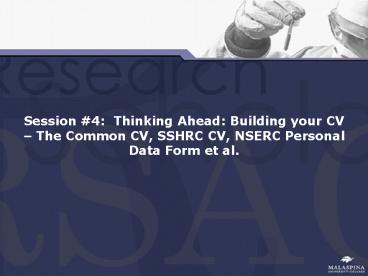Session - PowerPoint PPT Presentation
1 / 9
Title:
Session
Description:
Session #4: Thinking Ahead: Building your CV ... and chosen password; remember to update as bi-annual password updates are common. ... CHECK for annual updates. ... – PowerPoint PPT presentation
Number of Views:36
Avg rating:3.0/5.0
Title: Session
1
Session 4 Thinking Ahead Building your CV
The Common CV, SSHRC CV, NSERC Personal Data Form
et al.
2
Session 1 Planning Your Scholarly Activity
Agenda Getting Started in Research Session 2
Determining Program Appropriateness for Your
Research Is this the Right Funding Opportunity
for You? Session 3 Proposal/Project
Management Setting Timelines, Setting Critical
Deadlines and Avoiding the Last Minute
Rush Session 4 Thinking Ahead Building your
CV The Common CV, SSHRC CV, NSERC Personal Data
Form et al. Session 5 Program Objectives and
Funding Criteria How will my Application be
Assessed? Session 6 Lay Summary/Summary of
Proposed Research Describing your Research
Expertise to an Audience of Eighth Grade
Students Session 7 Budgeting 101
Interpreting Program Eligible Expenses and
Effectively Justifying your Budget
Request Session 8 Getting the Most from the
Writing Process Peer Review, Proofreading and
Polishing
3
Why Build an Online CV?
- Applying for Federal Funding
- Principal Investigator
- Co-Applicant
- Identifiable Common Format
- Networking
- Familiarity with Agency eApplication Formats
- Long-Term Planning
- Identification of Future Needs
- Filling in the Gaps
4
Hints
- SAVE your assigned agency login code and chosen
password remember to update as bi-annual
password updates are common. - HEED formatting guidelines, including appropriate
header and maximum page number guidelines. - CHECK for annual updates. Though attachment
template amendments are rare, applicants should
reference the Research and Scholarly Activity
website for the current attachment templates,
updated each fall. - UPDATE as appropriate. Make online CV updates
part of your celebrations upon notification of
publication acceptance, undergraduate honors
thesis defense, and/or notification of approval
of funding. - MAINTAIN a current copy of your curriculum vitae
in a more standard format, i.e. MS Word, etc. for
reference and/or special cases. - FILL in your gaps. If your first online CV build
identifies gaps in your research and scholarly
activity, implement efforts to fill these gaps in
your long-term research and scholarly activity
plan.
5
Social Sciences and Humanities Research Council
(SSHRC)
- Curriculum Vitae
- Online
- Identification
- Current Position
- Address
- Work Experience
- Academic Background
- Credentials
- Research Expertise
- Funded Research
- Attachment
- Research Contributions Over the Last Six Years
- Other Research Contributions
- Most Significant Career Research Contributions
(for Regular Scholars) - Career Interruptions and Special Circumstances
and
6
Natural Sciences and Engineering Research Council
(NSERC)
- Personal Data Form
- Online
- Person Profile
- Current Employment
- Address
- Academic Background
- Experience
- Expertise
- Research Support
- HQP
- Eligibility (Univ.)
- Applicant's Activities
- Attachment
- Most Significant Contributions to Research and/or
to Practical Applications - Research Contributions and Practical Applications
7
Canadian Institutes for Health Research (CIHR)
- The Common CV
- Online
- Identification
- Contact information
- Language skills
- Academic background
- Distinctions/Awards/Credentials
- Work experience
- Expertise
- Funding
- Supervisory experience
- Contributions - summary
- Attachment
- Contributions - detail
8
Choosing Your Online CV Format
- Social Sciences and Humanities Research Council
(SSHRC) - Curriculum Vitae
- Natural Sciences and Engineering Research Council
(NSERC) - Personal Data Form
- Canadian Institutes for Health Research (CIHR)
- The Common CV
- The Common CV Network is a partnership of
Canadian organizations that provide research
funding, working together to streamline the
process researchers use to submit their
Curriculum Vitae (CV). The Common CV system,
launched in July 2002, is a web-based tool that
allows researchers to manage their CV data in a
single repository and generate multiple CVs to
member organizations.
9
Questions?



























![READ[PDF] Session Notes, Referral Log, Supervision Notes & Group Notes PowerPoint PPT Presentation](https://s3.amazonaws.com/images.powershow.com/10086898.th0.jpg?_=20240727079)
![READ[PDF] Session Notes, Referral Log, Supervision Notes & Group Notes PowerPoint PPT Presentation](https://s3.amazonaws.com/images.powershow.com/10086899.th0.jpg?_=20240727079)


